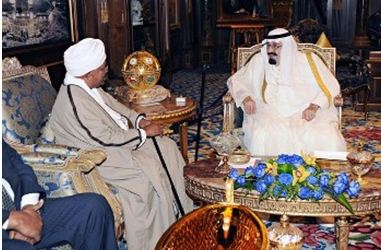Ban on bilateral bank dealings strains relations between Sudan, Saudi Arabia
March 1, 2014 (KHARTOUM) – A senior official in Sudan’s ruling National Congress Party (NCP) admitted yesterday that his country’s ties with Saudi Arabia are strained in the wake of Riyadh’s decision to bar its banks from dealing with its Sudanese counterparts.

“There is so much that is being done now, both public and non-public to bring things back to their original state,” the NCP official was quoted as saying by al-Taghyeer online news portal.
Ahmed rejected using the term blockade to describe Saudi Arabia’s decision stating that the Arab Gulf nation “does not embargo Sudan”.
Over the few years there have been mounting signs of deteriorating relations between Khartoum and Riyadh.
Last August, Saudi Arabia closed its airspace to the plane carrying Sudanese president Omer Hassan al-Bashir on his way to Iran where he was scheduled to attend the inauguration ceremony of president-elect Hassan Rouhani thus forcing him and his delegation to return home.
Observers speculated that Sudan’s growing ties with Iran could have irked the Saudis prompting them to block Bashir’s flight.
Sudan has allowed Iranian warships to dock in Port Sudan three times over the last year and a half, drawing concern by the United States and its allies in the Gulf.
The mostly Sunni Muslim Arab Gulf states are wary of Iranian influence in the Middle East, fearing the Shiite-led country is seeking regional dominance that will stir sectarian tensions.
The Syrian conflict has also increased the divide between the two sides, with Arab monarchies supporting the rebels and Iran backing the Al-Assad regime.
Bashir, who performed the Muslim Hajj (pilgrimage) last year, did not meet with King Abdullah bin Abdulaziz during the visit, despite the Saudi monarch holding separate talks with the Turkish and Pakistani presidents who also performed Hajj this year.
On Saturday, the Sudanese finance minister, Badr al-Deen Mahmoud attributed a decision made by several foreign banks to stop dealings with their Sudanese counterparts to pressures exercised on them by the United States.
Saudi Arabia and some European banks have reportedly suspended their dealings with Sudan as of the February 28th. Sudanese officials initially refused to comment on the move which was widely circulated within the business community in Khartoum.
There was no comment from Saudi Arabian Monetary Agency (SAMA) and it is not clear if the latter issued the directive or if it was decision by individual banks.
Mahmoud said that two Saudi banks have suspended their financial transactions with Sudan, describing banking interactions particularly with the Arab countries as crucial because it links Khartoum to the international banking system.
He pointed to pressures exerted by the US on some banks dealing with Sudan and said those pressures have existed since 1997, disclosing ongoing arrangements to overcome negative effects of the decision.
US sanctions dating back to the Clinton administration in 1997 bars any financial dealings with Sudan or institutions owned by Khartoum which complicates Sudan’s access to international financial markets and US dollars.
But the minister’s comment contradicted a statement issued by the Central Bank of Sudan (CBoS) on Thursday in which it attributed the move to what it termed routine banking procedures by the financial institutions.
According to the CBoS, the decision is related to internal procedures within the framework of institutional control at those banks.
“This is normal in the field of banking that experiences continuous changes”, it added.
QUICK DECISION NEEDED ON SUDAN EXTERNAL DEBT
The finance minister warned against failure of Sudan and South Sudan to agree on how to split foreign debt in the framework of the Tripartite Committee.
The Tripartite Committee between the African Union (AU), Khartoum and Juba on debt relief is a platform which is formed to strengthen relations between the two countries and coordinate outreach efforts towards creditors.
Khartoum inherited the entire external debt that existed prior to the secession of the south. The two countries have yet to agree on how to split up the debt.
Both sides decided to reach out to creditors to obtain debt relief and if that fails will sit down to see how it can be divided using the “zero option”.
Mahmoud, who spoke on Saturday in a workshop on assessment of the 2009 family basic data survey, said failure to reach an agreement on foreign debt issue within the specified period would lead to major complications that might threaten stability and ignite war between the two countries again.
He urged international financial institutions to cancel Sudan’s foreign debts away from political agendas, saying the workshop and the Anti-Poverty Strategic Framework (APSF) are part of the requirements of debt cancellation.
The minister affirmed that Sudan has met the technical requirements for foreign debt cancellation through short-term programs with the International Monetary Fund (IMF), saying data shows that Sudan achieved more than required.
“We were unable to benefit from the international initiatives on debt relief due to political reasons”, he said.
He underscored cooperation of Khartoum with Juba to arrive at a decision on splitting foreign debt within two years and did not rule out possibility of deterioration of relations and return to war between the two countries if they failed to split foreign debt.
Around three quarters of Sudan’s $40 billion plus external debt are owed to the Paris Club of creditor nations and other non-member states. The remaining balance is equally divided between commercial banks as well as international and regional financial bodies.
In April of 2013, the IMF’s Mission Chief for Sudan Edward Gemayel said that it will be near impossible for Sudan to secure debt relief even if it satisfied technical and economic requirements.
“I’m not saying this is impossible but it is difficult because it is linked to political issues which require a public relations effort with member countries”, he said.
Gemayel pointed out that any debt relief deal with Sudan would require the unanimous consent of all 55 countries in Paris Club which he suggested would be improbable.
(ST)
